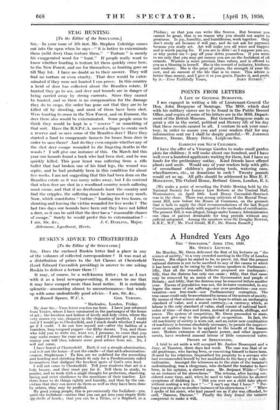A Hundred -Years Ago Tim " SPECTATOR," Aram 17TH, 1830. MR.
OWEN'S ticruius.
On Monday, Mr. Owen delivered the first of his lectures on "the science of society," to a very crowded meeting in the City of London Tavern. His objet he stated to be, to prove, 1st, that the present national distress is not todie ascribed to any of the causes to which it has been said to be owing by the various speakers in Parliament ; 2dly, that all the remedies hitherto proposed are inadequate ; 3clly, that the distress has only one cause ; 4thly, that that cause may be removed by an union of the Government and people of Britain ; and 5thly, that the distress may be removed before another year: Excess of population was not, the lecturer contended, in any degree the cause of our suffering—nor over-production—nor, over- taxation—nor free-trade—nor Parliamentary corruption. The true cause could only be ascertained by means of the Science of Society. By means of that science alone can we hope to attain an unchanging standard of- value, and a. sound eurrency-a currency, which, as labour is the only standard of value, shall cpnsist of national bank- notes of time—of days and hours, instead of pounds, Shillings; and pence. The system of competition, Mr. Owen proceeded to state, must now give way to the principle, of co-operation. Irk fact, the old machinery of seciety is worn out, andan entire new combination of machinery is become absolutely necessary,' tepermit the improve- ment of modern times to be applied to the benefit of the 'human race. Modem extension of ,mechanie power, and other improve- ments, have rendered .manual labour of little commercial Value.
• PEOOFS OF IIREWDNESS2 A trial to set aside a will occupied Mr. Justice Bosanquet and a Jury, at Taunton, three days last week. The cake was that a an old gentleman, who having been, or conceiving himself to have beau, ill-used by his relations, bequeathed his property to a servant who had recommended herself by her assidaities to the fancy of the vale- tudinarian. Amongst the witnesses as to the state of the testator's understanding, was a clergyman, who declared the testator to have been, in his opinion a shrewd man. • Mr. Serjeant Wilde--" Give us an instance of his shrewdness." The, witness, after having con- sidered some time, said, when he used to take medicine he showed symptoms of disliking it. "Did you ever see a child take physic without making a wry face ? "—" I can't say that I have." "Per- haps you can give us another instance of his shrewdness 1." "When I spoke of hissister, who had passed me as if ahe was offended, ho said, 'Demme, Darnme.' " Finally the jiny found the' teitatOr Competent to make ti










































 Previous page
Previous page